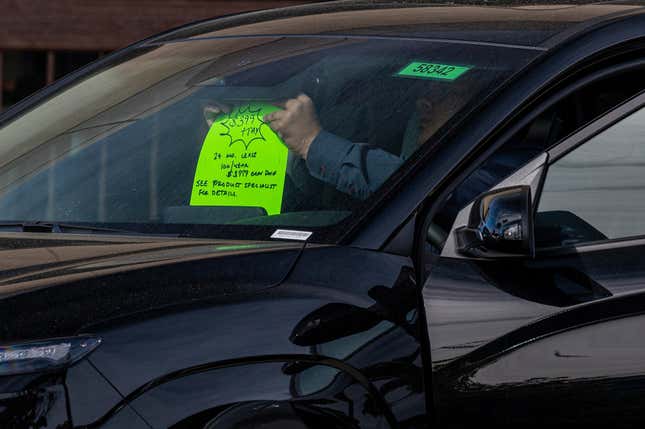Not Even Used Cars Can Escape Subscriptions

Automakers aren’t just happy getting new-car buyers to pay recurring subscription fees for luxury upgrades — now, they’re working on launching subscriptions in used cars, which have thus far been immune to the monthly fees on many of the latest BMW, Volvo, General Motors and Toyota models. Now that newer vehicles are hitting the U.S. used-car market, there are more models with subscription-powered connected capabilities available to secondhand buyers. And carmakers now see their proprietary apps and services as the best way to lure used-car owners into subscriptions, as Wired reports.
Apple Is Still Trying to Make Your Phone Into Your Car Key
In case you missed it:
Research from LexisNexis suggests that the majority of used-cars owners, or about 83 percent, are not fully taking advantage of these apps and services, which often come with subscription fees to access certain software and hardware features.
Toyota has Remote Connect, for example, which lets you remotely lock, unlock, or start your car from a smartphone app. There’s also GM’s subscription-based Super Cruise advanced driver-assistance system, as well as the ubiquitous OnStar, which provides crash response and roadside assistance. All of these services function as software add-ons that new-car owners can activate or deactivate long after purchasing their vehicle.
Photo: Daniel Acker (Getty Images)
G/O Media may get a commission

HEALTHIER HAIR
Augustinus Bader Hair Revitalizing Complex
Improve your hair today
The Hair Revitalizing Complex was tested via double blind trial to compare those taking it to those on a placebo. Those on the supplement were found to have increased their hair count by 56%, hair shine by 100%, and a 98% reduction in hair damage when compared to those taking the placebo. If these are the results you’re looking for, you can get a one-month supply (30 days) for just $130.
Used-car buyers are now getting roped into the same familiar song and dance that now accompanies buying anything from a smartwatch to a bathroom scale: you buy a device, go to your smartphone’s app store, then download the corresponding app. And that’s the constant point of contact carmakers need, per Wired:
“Connected cars have completely changed the landscape of customer interaction,” says Michael Bensel, vice president of mobility and connected services at Cariad, the Volkswagen Group’s automotive software subsidiary. He describes the company’s relationship with car buyers as shifting “from occasional contact at dealerships at times of purchase, maintenance, or repairs, to continuous direct customer contact during the entire ownership period.”
Funny how the elevator pitch for subscriptions always revolves around choice; buyers can opt in or out whenever they so choose, say automakers. But that’s just a palatable way of saying that features that were once permanent in a car simply aren’t anymore.
With the average age of cars on U.S. roads approaching 12 years old, carmakers now see used-car buyers as an untapped market potentially worth billions. As Wired explains, General Motors CEO Mary Barra cites internal company research showing that car buyers are willing to spend, on average, $85 a month on subscriptions.
Whether that’s an aggregate of all the other monthly fees we’ve begrudgingly accepted is unclear, but GM estimates annual subscriptions could yield $25 billion per year by 2030. There’s likely more money to be made by targeting every subsequent car buyer, not just the first, which is why it’s hardly surprising that the subscription model would creep into used cars at some point.

Photo: David Paul Morris (Getty Images)




